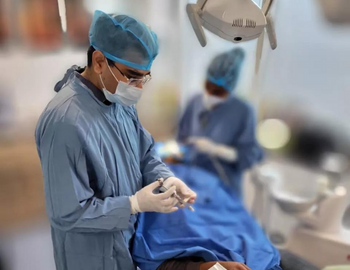Mucocele
What is a Mucocele?
A mucocele is a fluid-filled swelling that occurs inside the mouth, commonly on the lower lip, tongue, floor of the mouth, or inner cheeks. It develops due to the blockage or rupture of a salivary gland duct, causing mucus to accumulate and form a soft, painless lump. While most mucoceles are harmless and may resolve on their own, persistent or large ones may require medical attention.
These oral cysts can be concerning when they interfere with eating, speaking, or oral hygiene. If left untreated, they can become chronic, causing discomfort and potential infection. The swelling may fluctuate in size, sometimes disappearing and reappearing, making it seem harmless. However, recurrent mucoceles could indicate an ongoing issue with the salivary glands, requiring professional assessment. Additionally, frequent irritation or trauma to the area can lead to inflammation, making the mucocele more noticeable and bothersome over time.
Mucoceles may appear translucent or bluish, depending on their depth within the oral tissue. Surface mucoceles are often more noticeable and can rupture spontaneously, releasing a clear or slightly thickened fluid. Deeper mucoceles may feel firmer and be less obvious at first. While they are generally painless, larger mucoceles may create an uncomfortable sensation, particularly when they press against the teeth or tongue. Seeking treatment from an expert like Dr. Himanshu Gupta, a renowned Dental Implant Surgeon specializing in Oral & Maxillofacial Surgery, ensures accurate diagnosis and effective management of oral pathologies like mucoceles. With advanced treatment options available, addressing a mucocele promptly can prevent it from worsening and causing additional oral health issues.
Why is it Important to Address a Mucocele?
While mucoceles are generally benign, addressing them promptly is crucial to prevent complications. Some mucoceles may enlarge over time, causing discomfort or interfering with daily activities like eating and speaking. Recurring mucoceles may indicate an underlying issue, such as chronic trauma or a blocked salivary gland, which requires professional evaluation.
Ignoring a mucocele can lead to persistent discomfort, making it difficult to manage oral health effectively. If a mucocele bursts, it may temporarily shrink, leading patients to believe it has healed. However, if the underlying cause is not addressed, the cyst is likely to return. Repeated rupture and healing cycles can lead to scarring, which may make future treatment more challenging. In some cases, untreated mucoceles can develop into deeper tissue cysts, which are harder to manage and may require more invasive intervention.
Seeking expert care from Dr. Himanshu Gupta at the Oral Surgery and Dental Implant Center in Gurgaon ensures that the mucocele is diagnosed accurately and treated effectively to restore comfort and oral function. Dr. Gupta’s expertise in Oral & Maxillofacial Surgery allows him to provide the most suitable treatment approach, whether it be conservative management, minor surgical excision, or laser therapy. His patient-centered approach ensures that each individual receives the best possible care tailored to their specific needs, preventing recurrence and promoting long-term oral health.

If you are experiencing a persistent lump in your mouth, schedule an appointment with Dr. Himanshu Gupta today. Early diagnosis and proper treatment can prevent discomfort and complications.
Contact the Oral Surgery and Dental Implant Center in Gurgaon to get expert consultation and care for oral pathologies like mucoceles.
Types of Mucoceles
Mucoceles can be classified into different types based on their location and underlying cause. Understanding the different types is essential in determining the best course of treatment and ensuring effective management of the condition. While some mucoceles are small and harmless, others may grow larger and cause significant discomfort, interfering with daily activities such as eating, speaking, and maintaining oral hygiene. Below are the primary types of mucoceles:
Superficial Mucocele
These appear as small, clear, or bluish blisters on the inner lips, tongue, or cheeks. They are often caused by minor trauma, such as accidental biting or irritation from sharp teeth. Though they may not be painful, they can cause discomfort when speaking or chewing. Superficial mucoceles tend to burst on their own but may recur if the underlying cause is not addressed.
Deep Mucocele
These mucoceles form within the deeper layers of oral tissue and may appear larger and firmer. Unlike superficial mucoceles, deep mucoceles do not resolve as easily and may require medical intervention to prevent further growth or recurrence. They can sometimes mimic other oral pathologies, making professional diagnosis crucial.
Ranula
A special type of mucocele that occurs on the floor of the mouth due to blocked sublingual salivary glands. These cyst-like swellings can become large and interfere with eating, swallowing, and speaking. If left untreated, ranulas may extend deeper into the tissues of the neck, causing complications. Ranulas often require surgical removal, particularly if they cause persistent discomfort.
Consulting an expert in Oral & Maxillofacial Surgery, such as Dr. Himanshu Gupta, ensures precise diagnosis and effective treatment. Dr. Gupta’s expertise in treating oral pathologies guarantees a tailored approach to managing mucoceles, ensuring long-term relief and prevention of recurrence.
Why Choose Dr. Himanshu Gupta?
When it comes to diagnosing and treating oral pathologies like mucoceles, expertise and experience matter. Choosing the right specialist can make a significant difference in achieving effective and lasting results. Dr. Himanshu Gupta, a leading Dental Implant Surgeon and expert in Oral & Maxillofacial Surgery, has extensive experience in diagnosing and treating a variety of oral conditions, including mucoceles. Here’s why patients trust him for their care:
Expert Diagnosis
With years of experience in oral health and surgery, Dr. Gupta can accurately identify and assess the severity of a mucocele, ensuring that the most suitable treatment plan is implemented.
Advanced Technology
His clinic is equipped with state-of-the-art diagnostic and treatment tools, ensuring precise and effective care for each patient.
Customized Care Plans
Each patient has distinct needs, and their treatment is tailored accordingly. Dr. Gupta customizes each treatment plan based on the severity, location, and recurrence of the mucocele, ensuring the best possible outcome.
Comprehensive Care
From simple drainage procedures to complete surgical excision, Dr. Gupta offers a wide range of treatment options tailored to each patient’s needs.
Patient-Centered Approach
Dr. Gupta prioritizes patient comfort and well-being, providing compassionate care and clear explanations throughout the treatment process.
Choosing a trusted Dental Implant Surgeon and expert in Oral & Maxillofacial Surgery like Dr. Himanshu Gupta guarantees expert care and effective treatment for oral pathologies like mucoceles. His extensive experience and patient-focused approach make him the preferred choice for individuals seeking reliable and long-term solutions.
Diagnosis of a Mucocele
Proper diagnosis of a mucocele is essential to rule out other oral conditions and ensure the most appropriate treatment. Mucoceles can sometimes be mistaken for other oral cysts or growths, making professional evaluation crucial. Dr. Himanshu Gupta follows a comprehensive diagnostic process to confirm the presence of a mucocele and determine its severity:
- Clinical Examination: The first step in diagnosing a mucocele is a thorough visual and physical examination. Dr. Gupta assesses the size, location, and consistency of the lump to determine whether it is a superficial or deep mucocele.
- Medical History Review: Understanding potential causes, including trauma, dental habits, and previous occurrences of mucoceles, helps in planning effective treatment.
- Biopsy (If Necessary): In some cases, a biopsy may be performed to rule out other conditions, such as cysts or tumors. A small sample of the tissue is taken and examined under a microscope for accurate diagnosis.
- Imaging Tests: For deeper mucoceles or ranulas, imaging techniques such as ultrasound or MRI may be used to assess the lesion’s extent and identify any underlying issues.
Early diagnosis ensures prompt and effective treatment, preventing complications and promoting optimal oral health. Seeking an expert like Dr. Himanshu Gupta guarantees an accurate diagnosis and a well-planned treatment approach.
Treatment for Mucoceles
The treatment for a mucocele depends on its size, location, and severity. Some of the most effective treatment options include:
Medications
• Topical or oral anti-inflammatory medications to reduce swelling.
• Antibacterial mouthwashes to prevent infections and promote healing.
Lifestyle Adjustments
• Avoiding lip-biting or other habits that contribute to mucoceles.
• Maintaining good oral hygiene to prevent secondary infections.
Minimally Invasive Procedures
• Aspiration: Draining the fluid from the mucocele to provide temporary relief.
• Laser Therapy: A painless procedure that helps remove the mucocele with minimal discomfort and fast healing time.
Surgical Removal
• If a mucocele is recurrent or large, surgical excision may be necessary to remove the affected salivary gland completely and prevent recurrence.
• The procedure is performed under local anesthesia and ensures long-term relief.
Seeking expert care from Dr. Himanshu Gupta, a specialist in Oral & Maxillofacial Surgery, ensures effective treatment and long-term relief from oral pathologies like mucoceles.
Symptoms of a Mucocele
- A soft, fluid-filled lump in the mouth.
- Bluish or translucent appearance.
- Painless swelling that may rupture and reappear.
- Discomfort when eating or speaking.
- Recurrent occurrence, especially in individuals with habits like lip-biting.
Causes of a Mucocele
Several factors contribute to the formation of a mucocele, including:
- Trauma or Injury: Accidental biting of the lip or cheek is one of the most common causes of mucoceles.
- Blocked Salivary Glands: Due to mucus buildup, leading to swelling and the formation of a cyst-like lump.
- Habitual Lip or Cheek Biting: Repeated trauma can cause chronic mucoceles that persist or recur frequently.
- Dental Appliances: Ill-fitting dentures or braces can contribute to irritation and mucus retention.
Understanding the underlying cause is crucial for effective treatment and prevention. By addressing these factors, patients can reduce their risk of developing mucoceles and maintain better oral health.

Frequently Asked Questions (FAQ)
Mucoceles are generally painless but may cause discomfort when eating or speaking.
Some mucoceles resolve spontaneously, but persistent ones require medical attention.
Avoiding lip-biting and maintaining good oral hygiene can reduce the risk of mucoceles.
If the lump persists for more than two weeks or causes discomfort, consult Dr. Himanshu Gupta for evaluation and treatment.
Treatment depends on severity; options include aspiration, laser therapy, or surgical excision.

